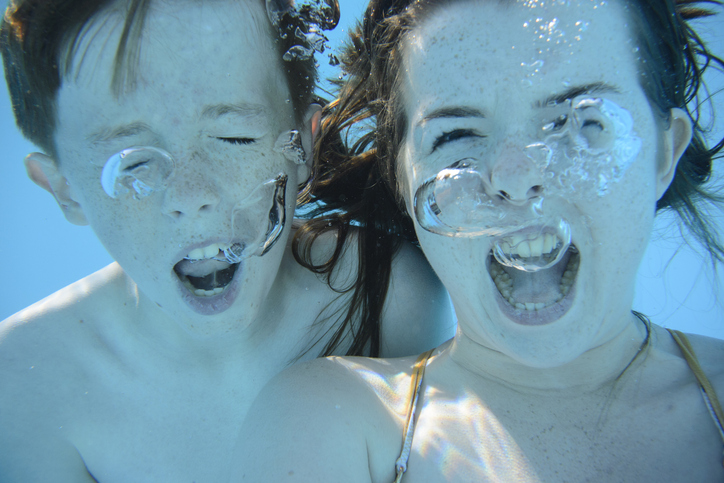A “healthy fear” of water may appear to be lifesaving for non-swimmers, but it presents a large roadblock when it comes to swim lessons. Maybe this is your first time considering swim lessons for your child, but you know how bath time is a challenge. Maybe you’ve tried two different swim schools and three different instructors, but little progress was made each time. Anxiety concerning water is common, and nothing that can’t be overcome with patience and consistency.
Progress must be approached with patience and consistency
You may remember your first “swim lesson”, which was really just dad tossing you in the deep-end and yelling “now swim!”. You probably also remember panicking, possibly choking, and not trusting your dad for a while after that. Chances are, it probably didn’t make you a strong or confident swimmer either. With the dozens of students I’ve had, from age 2 to 42, not once was a ”rip the band-aid off” approach needed, nor appropriate. Children learn at different rates from one another, and in different ways too.
So where do you start?
The longer the break between lessons, the harder it is to build on the progress the swimmer has made.
When picking home swim lessons, you have the advantage of deciding how many lessons you feel are appropriate, and which days are most convenient. However, 1-2 lessons a week generally isn’t sufficient in the case of fearful swimmers. With my experience, I’ve seen the progress level of a student who has one lesson a week, for three months, to be the same as a student who has three lessons a week, for two weeks. You don’t necessarily need more lessons, just have them more frequently.

Plan for at least 3 lessons per week, spaced out as evenly as your schedule allows.
( It’s better to have lessons on Monday, Wednesday, and Friday, with the longest break being two days, compared to Monday, Tuesday, Wednesday, with the longest break being four days until the next lesson.)
Playing doesn’t require the absence of learning
Practicing skills on off days with your child will help them progress much quicker during lessons. They may be excited to show off what they’ve learned later during bathtime, or want to play a game from lessons next time you head to the pool. Find what makes them excited about their lessons. Swim lessons should be fun, and any new skill can be made into a game with some imagination. What does your child like? Do they enjoy singing or dancing? For children under 3, there are many nursery rhymes and even lullabies found online where skills such as getting their face wet, learning to paddle, or blowing bubbles are incorporated into the song. For older children, what types of games do they like? Some children enjoy searching for toys underwater, which encourages using goggles or putting their eyes in the water. Others may like “going fishing”, where they can hold onto a float and kick around the pool collecting their toys. If they like pretending or playing dress-up, turn it into a pool game. Is your pool a little chilly? You can try pretending you’re both penguins in Antarctica, diving for fish. For some kids, it’s simply fun to just kick and see how big they can make their splashes. Playing is a great distraction from what kids fear, and it doesn’t require the absence of learning. Let imaginations run wild.
- Take a skill, and turn it into a game at home. If your child doesn’t want to “practice blowing bubbles”, make it sound more fun! (e.g. “blow out the birthday candles underwater” or “how loud can you be underwater?”)
Minimizing distractions goes a long way
So, what if you practice the games at home, you choose to have four lessons a week, but your child starts crying as soon as the instructor arrives, and it seems as though they’ve shut down?
The most important factor- besides ensuring your child trusts the instructor, is minimizing distractions. For starters, it’s best if you stay out of sight to allow your child to calm down. If you have lessons at a public or neighborhood pool, perhaps aim to have lessons at a non-peak hour. You can still monitor the lesson, just from indoors or where you’re out of your child’s line of sight. Remember the phrase: “Out of sight, out of mind”. If it’s just your child and the instructor, they can work together better. Once your child becomes comfortable with lessons, you can try sitting by the pool again.
- If your child isn’t calming down once the lesson has started, move to an area where they can’t see you. They can focus better on the instructor instead of convincing you to take them out of the pool.
The most important thing you can remember during this swim season is that progress will come with patience and consistency. It may be frustrating or stressful seeing no progress one day, and only a baby-step the next, but remember that overcoming a fear isn’t easy. Schedule more than 1-2 lessons per week, talk to your instructor about practicing skills at home, turn skills into games, and minimize distractions, and congratulate any progress your child makes.
Happy swimming and happy summer!
Alexa’s Bio:
My name is Alexa Dunbar, and I’m a current college student studying chemistry. I’ve been teaching swim lessons for about four summers now, and 2020 will be my second with Sunsational. I have my CPR/AED and first aid certifications through the Red Cross, and two years of swim lesson instruction/ water survival training through another national swim school. I love working with children, and helping them develop a love of the water. Swim lessons are essential for safety, but they also open the door to so many fun summer activities and sports. No matter how young or old you or your child are, I highly encourage swim lessons for everyone.
ABOUT SUNSATIONAL SWIM SCHOOL
Sunsational Swim School is the 🥇 #1 rated provider of private, at-home swimming lessons in America. We have specialized swim instructors for students ages 6 months to adult, beginner to advanced. Featured on ABC, CBS, Impact 100, The List and others, Sunsational instructors have a minimum of 2 years of teaching experience, are CPR certified and insured, and have collectively taught over 302,223 lessons for more than 74,415 students nationwide!




